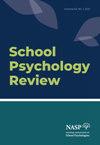走向学校评估的公平:结合协作/治疗技术重新分配权力
IF 3
3区 心理学
Q1 Social Sciences
引用次数: 2
摘要
摘要心理教育评估已被用作一种工具,根据儿童的假定能力将儿童划分为学业轨道。从历史上看,这种跟踪是基于一些措施,试图使有关有色人种儿童能力的种族主义假设合法化。尽管法律规定和实践上的变化旨在纠正这些不公正,有色人种的孩子仍然不成比例地被划分到不太严格的学术领域,这主要是基于评估结果。本文借鉴协作/治疗性评估模型,提出这些技术如何通过评估关系中的共享权力来提高校本评估的公平和公平性。我们认为,协作/治疗方法可以促进儿童和家庭对评估的积极体验,我们鼓励对这些技术进行进一步研究,以确定它们如何有助于更公平的学校成绩。我们总结了这些技术如何促进学校心理学目标的基本原理。本论文显著有助于纠正学校心理学家如何进行心理教育评估中存在的普遍问题,特别是对有色人种的儿童和家庭。考虑到学校心理专业绝大多数是白人,特殊教育转介和安置中的种族不成比例是该领域根深蒂固的不公正现象,迫切需要纳入新技术,以更公平地评估和服务有色人种儿童和家庭。这里描述的协作/治疗性评估技术为学校心理学家提供了具体的方法,以实现NASP《学校心理学统一反种族主义声明和行动呼吁》中提出的理想。本文的补充数据可在https://doi.org/10.1080/2372966X.2021.1997060上在线获得。本文章由计算机程序翻译,如有差异,请以英文原文为准。
Toward Equity in School-Based Assessment: Incorporating Collaborative/Therapeutic Techniques to Redistribute Power
Abstract Psychoeducational assessment has been used as a tool to sort children into academic tracks based on children’s presumed capabilities. Historically, such tracking was based on measures that sought to legitimize racist assumptions about the capabilities of children of color. Despite legal mandates and changes to practice intended to correct these injustices, children of color continue to be disproportionately sorted into less rigorous academic tracks largely based on assessment results. This article draws from the collaborative/therapeutic assessment model to propose how these techniques can increase equity and fairness in school-based assessments through shared power in the assessment relationship. We assert that a collaborative/therapeutic approach can contribute to children’s and families’ positive experience of assessment, and we encourage further research on these techniques to determine how they may contribute to more equitable school outcomes. We conclude with a rationale for how these techniques advance the goals of school psychology. Impact Statement This paper significantly contributes to correcting the pervasive problems that exist in how school psychologists conduct psychoeducational assessments, particularly with children and families of color. Considering that the school psychology profession is overwhelmingly White, and that racial disproportionality in special education referrals and placements is an entrenched injustice in the field, there is an urgent need for the inclusion of new techniques to more fairly assess and serve children and families of color. The collaborative/therapeutic assessment techniques described here offer concrete ways for school psychologists to work toward the ideals put forth in NASP’s School Psychology Unified Antiracism Statement and Call to Action. Supplemental data for this article is available online at https://doi.org/10.1080/2372966X.2021.1997060 .
求助全文
通过发布文献求助,成功后即可免费获取论文全文。
去求助
来源期刊

School Psychology Review
Social Sciences-Education
CiteScore
6.90
自引率
20.00%
发文量
54
期刊介绍:
School Psychology Review (SPR) is a refereed journal published quarterly by NASP. Its primary purpose is to provide a means for communicating scholarly advances in research, training, and practice related to psychology and education, and specifically to school psychology. Of particular interest are articles presenting original, data-based research that can contribute to the development of innovative intervention and prevention strategies and the evaluation of these approaches. SPR presents important conceptual developments and empirical findings from a wide range of disciplines (e.g., educational, child clinical, pediatric, community.
 求助内容:
求助内容: 应助结果提醒方式:
应助结果提醒方式:


